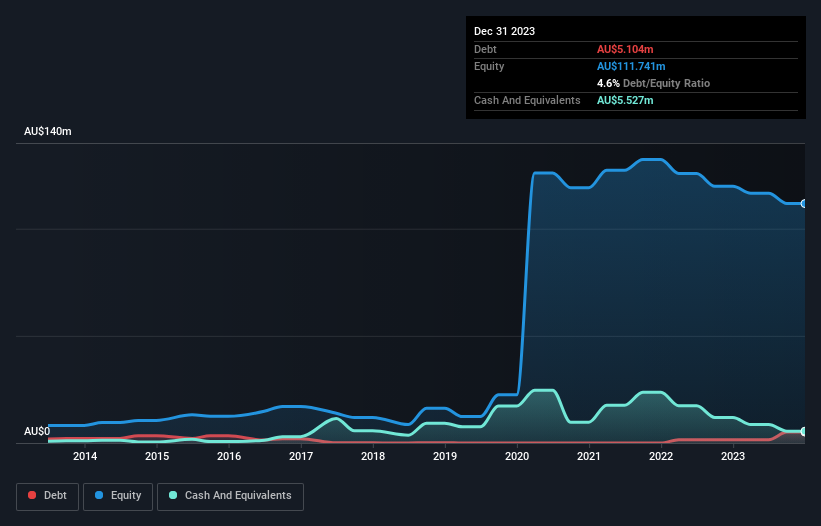Envirosuite (ASX:EVS) Has Debt But No Earnings; Should You Worry?
Legendary fund manager Li Lu (who Charlie Munger backed) once said, 'The biggest investment risk is not the volatility of prices, but whether you will suffer a permanent loss of capital.' So it might be obvious that you need to consider debt, when you think about how risky any given stock is, because too much debt can sink a company. Importantly, Envirosuite Limited (ASX:EVS) does carry debt. But should shareholders be worried about its use of debt?
What Risk Does Debt Bring?
Debt assists a business until the business has trouble paying it off, either with new capital or with free cash flow. If things get really bad, the lenders can take control of the business. However, a more usual (but still expensive) situation is where a company must dilute shareholders at a cheap share price simply to get debt under control. Of course, debt can be an important tool in businesses, particularly capital heavy businesses. When we examine debt levels, we first consider both cash and debt levels, together.
See our latest analysis for Envirosuite
How Much Debt Does Envirosuite Carry?
You can click the graphic below for the historical numbers, but it shows that as of December 2023 Envirosuite had AU$5.10m of debt, an increase on AU$1.50m, over one year. But it also has AU$5.53m in cash to offset that, meaning it has AU$423.0k net cash.

How Healthy Is Envirosuite's Balance Sheet?
According to the last reported balance sheet, Envirosuite had liabilities of AU$22.5m due within 12 months, and liabilities of AU$8.74m due beyond 12 months. On the other hand, it had cash of AU$5.53m and AU$13.2m worth of receivables due within a year. So it has liabilities totalling AU$12.5m more than its cash and near-term receivables, combined.
Envirosuite has a market capitalization of AU$59.6m, so it could very likely raise cash to ameliorate its balance sheet, if the need arose. However, it is still worthwhile taking a close look at its ability to pay off debt. While it does have liabilities worth noting, Envirosuite also has more cash than debt, so we're pretty confident it can manage its debt safely. When analysing debt levels, the balance sheet is the obvious place to start. But ultimately the future profitability of the business will decide if Envirosuite can strengthen its balance sheet over time. So if you want to see what the professionals think, you might find this free report on analyst profit forecasts to be interesting.
In the last year Envirosuite wasn't profitable at an EBIT level, but managed to grow its revenue by 10%, to AU$60m. That rate of growth is a bit slow for our taste, but it takes all types to make a world.
So How Risky Is Envirosuite?
Statistically speaking companies that lose money are riskier than those that make money. And the fact is that over the last twelve months Envirosuite lost money at the earnings before interest and tax (EBIT) line. Indeed, in that time it burnt through AU$9.0m of cash and made a loss of AU$9.9m. With only AU$423.0k on the balance sheet, it would appear that its going to need to raise capital again soon. Overall, we'd say the stock is a bit risky, and we're usually very cautious until we see positive free cash flow. When analysing debt levels, the balance sheet is the obvious place to start. But ultimately, every company can contain risks that exist outside of the balance sheet. For example, we've discovered 3 warning signs for Envirosuite (1 doesn't sit too well with us!) that you should be aware of before investing here.
When all is said and done, sometimes its easier to focus on companies that don't even need debt. Readers can access a list of growth stocks with zero net debt 100% free, right now.
Valuation is complex, but we're here to simplify it.
Discover if Envirosuite might be undervalued or overvalued with our detailed analysis, featuring fair value estimates, potential risks, dividends, insider trades, and its financial condition.
Access Free AnalysisHave feedback on this article? Concerned about the content? Get in touch with us directly. Alternatively, email editorial-team (at) simplywallst.com.
This article by Simply Wall St is general in nature. We provide commentary based on historical data and analyst forecasts only using an unbiased methodology and our articles are not intended to be financial advice. It does not constitute a recommendation to buy or sell any stock, and does not take account of your objectives, or your financial situation. We aim to bring you long-term focused analysis driven by fundamental data. Note that our analysis may not factor in the latest price-sensitive company announcements or qualitative material. Simply Wall St has no position in any stocks mentioned.
About ASX:EVS
Envirosuite
Develops and sells environmental management technology solutions.
Reasonable growth potential and fair value.
Market Insights
Weekly Picks

Solutions by stc: 34% Upside in Saudi's Digital Transformation Leader


The AI Infrastructure Giant Grows Into Its Valuation
Recently Updated Narratives

Perdana Petroleum Berhad is a Zombie Business with a 27.34% Profit Margin and inflation adjusted revenue Business
Many trends acting at the same time


Engineered for Stability. Positioned for Growth.
Popular Narratives


MicroVision will explode future revenue by 380.37% with a vision towards success


NVDA: Expanding AI Demand Will Drive Major Data Center Investments Through 2026



